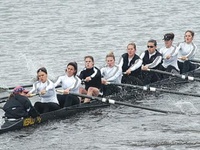Entering this season, Radcliffe seemed an unlikely candidate break the duopoly that Brown and Washington had held on the NCAA rowing championship in its six-year history. The Black and White rowers, representing a school that had never finished better than seventh overall at NCAAs, decided to take a step up this season. In doing so, they went all the way to the top.
Radcliffe capped the best season in its 31-year history by winning the NCAA championship, Harvard’s first in any sport since women’s lacrosse in 1990 and Radcliffe’s only national championship other than its previous crew title in 1973. Along the way, the Black and White toppled Brown’s five-year reign atop the Eastern Sprints throne.
“It was unbelievable,” said junior Sara Clark of the second varsity following Sprints. “Brown always comes into these events expecting to win. To watch that dynasty crumble and be a part of that was incredible.”
Brown dealt Radcliffe its only defeat in 11 dual races, but Radcliffe won where it counted most—at Sprints and NCAAs.
The Bears proved to be the deeper team at NCAAs, where they won both the varsity four and second varsity events, but they were doomed by their first varsity’s failure to make the grand final.
Radcliffe’s first varsity, meanwhile, proved to be the best of the bunch by far, and a fifth-place finish by the second varsity and a sixth-place finish by the varsity four gave Radcliffe just enough points to take home the overall team crown.
Washington did not relinquish its hold on the team crown easily either. The Huskies raced well enough in the second varsity and varsity hour events to control their own destiny for the NCAA title in the first varsity event. In fact, Radcliffe had to finish two spots ahead of Washington to win it all. If both Radcliffe and Washington had finished out of the top two spots, Brown would have won the title.
In a moment of dramatic irony, the rowers knew far less about the closeness of the championships than the spectators.
“We didn’t actually know the situation we were in,” said co-captain Courtney Brown. “The rest of the team knew what rankings we needed to get the trophy. We were just concerned about winning the race.”
That they did admirably. Washington jumped out to the early lead but faded back behind Stanford and Michigan into fourth place. Radcliffe went forward full speed ahead and won the first varsity NCAA crown.
The boat that began the season ranked just No. 13 was now indisputably the nation’s best.
The pollsters learned quickly that Radcliffe was underrated. When the April weather finally calmed and the Charles River thawed enough for racing, Radcliffe started its title run by stunning then-No. 3 Princeton.
The Black and White first varsity proved that race was no fluke by burning the competition with seven straight victories. The sole defeat of the season came April 27 at the hands of Brown, but the Black and White rowers kept their spirits up.
“The great thing is we’ll see [Brown] again at Sprints, and we’ll gain a considerable amount of speed in the next couple of weeks,” co-captain Sarah Psutka said after the loss. “I expect it will be a different story when we meet again.”
The loss became a motivating tool for the entire team in training for the much-anticipated Brown rematch at Eastern Sprints.
“It is a great incentive,” said sophomore Heather Schofield of the first varsity. “[The last race against Brown] was a close enough race that we think we can win.”
When the Black and White met Brown and Princeton again on the Cooper River in Eastern Sprints, the Radcliffe rowers’ confidence shined through.
Brown, Princeton and Radcliffe jockeyed for position for 1000 meters. Princeton got the early start as expected. Radcliffe pulled ahead of Brown in second place than made its move 200 meters past the halfway point.
“We were ahead of Princeton and our coxswain was just like, ‘You are in first place right now!’” Brown said. “We all latched on and would not let go.”
Radcliffe never trailed again and the Brown dynasty at Eastern Sprints was finished. The Black and White had all the confidence it needed going into NCAAs.
The rest is history.
—Staff writer John R. Hein can be reached at hein@fas.harvard.edu.
—Staff writer David R. De Remer can be reached at deremer@post.harvard.edu.
Read more in Sports
Crimson Looks to Add to Starting Success














